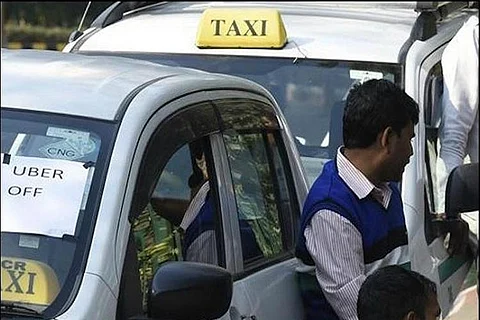

For the past ten days, drivers for taxi aggregator apps in Hyderabad are coming across some angry customers. “The customers are fighting with each other during ride-sharing. They are concerned when fellow passengers do not wear masks or gloves while in the car. A fight breaks out when someone sneezes or coughs, as people are afraid of the coronavirus,” says Raju, an Uber driver who has in the last ten days has been playing mediator between fighting commuters, concerned over contracting the coronavirus disease (COVID-19).
“But we drivers are also at risk of being exposed to the disease, we routinely ferry sick people to the hospitals and foreigners from the airport to hotels,” he adds.
On March 1, a taxi driver ferried a family from the Mumbai airport to Pune – they were returning after a vacation in Dubai. The couple and their daughter tested positive for coronavirus soon – and so did the taxi driver.
The report raised concerns among the drivers about their safety in their present work environment. “The companies are just sending us a text message with safety precautions – they should give us safety kits instead,” says Shaik Salauddin, National General Secretary, Indian Federation of App-Based Transport Workers (IFAT), representing drivers and delivery executives with aggregator apps in India.
“We are exposed’’
In the San Francisco bay area in the US, taxi aggregators Uber and Lyft are providing disinfectant for cars, medical help, and financial assistance to those drivers who have contracted the virus, reported Curbed New York. Reports suggest similar assistance has also been extended to those affected in Australia.
“But not in India,” says Shaik, “Here, they don’t even acknowledge the existence of unions.”
“The airport authorities in New York and London are sanitising cars before they leave the airports – we are in touch with the unions there. The drivers in London and Italy are falling sick. Some have died. We are very worried here. Whenever anyone falls sick, they always call us drivers to take them to the hospitals. Is anyone here thinking about how exposed we are?” he asks.
Airport authorities in Hyderabad told TNM that the aggregators have distributed face masks and sanitizers to the drivers, but only for those operating from of the airport as of now.
The awareness efforts
The drivers in the meantime have decided to adopt preventive measures themselves. In Telangana, ITFA held meetings to raise awareness and distributed 5,000 masks. In Karnataka, the drivers are creating awareness videos in Kannada. “But these are only awareness efforts and it doesn’t reach all drivers. Also, no way to know if they will follow the safety tips,” observes Sheik.
In Beijing, some taxi drivers have even adopted the improvised isolation bubble as a preventive measure against coronavirus spread.
While the WHO suggests that the public need not wear masks if they do not have the symptoms of the coronavirus disease, the drivers and delivery persons in India are spending money out of their own pockets to pay for these items, because customers don’t see it the same way as WHO.
Dharmendra Vaishnav is the president of Indian Delivery Lions, an association for Swiggy and Zomato delivery executives in Jaipur, Rajasthan. He is also the national general secretary with IFAT apart from being a delivery executive.
“If we don't wear masks, people are rejecting food,” Dharmendra tells TNM, “We have instances recorded in Mumbai, Chennai, Jaipur, Ajmeer, Kolta where customers rejected food from delivery executives. The customers are claiming the executives are not wearing gloves and face masks and so can’t accept food from them. In Mumbai such instances are higher in number.“
The job profile of a food delivery executive involves a lot of driving, waiting at restaurants, and going to unknown people’s homes. “On an average, an executive visits 20 to 30 homes. How do we know who is supposed to be in quarantine? We are very much exposed. We ride most of the day,” says a concerned Dharmendra. The food delivery apps have only sent text messages with preventive measures, he says, “But what about enforcement? Am travelling most of the day – where do I wash hands? While some restaurants allow us to use the restroom, most don’t.”
The impact
One impact of the coronavirus panic is a drop in ridership, says IFAT.
“The ridership has gone down,” says Inayat Ali, a driver from Bengaluru, and president of the state unit of IFAT in Karnataka, “I Used to get 15 to 20 rides a day, now I hardly get a ride while I am returning after a drop.”
Raju in Hyderabad has also been feeling the pinch: “Am just sitting at home on a Saturday – an otherwise busy day for me.”
With state governments in Telangana, Karnataka and Kerala restricting public gatherings, clubs events, educational institutions and more, the drivers say it’s going to be difficult to pay monthly EMIs for their vehicles.
TRS Kumar, president of the Online Tàxi Drivers Union in Kerala says, “The driver condition is very poor in Kochi and Thiruvananthapuram, with the increasing number of positive cases. The tourism business is done for. We are seeking help from the state Finance Minister and Chief Minister to talk to the banks and postpone our EMI payments for at least three months.”
The drivers in Karnataka have written to their Transport Minister, the Union Transport Minister and the RBI to push their case with the banks.
As of Saturday, in Telangana, only about six to eight Multi-National Companies have implemented work from home on the advice from their global headquarters abroad. No Indian IT firm has adopted these measures in Hyderabad, says Jayesh Ranjan, principal IT secretary, to TNM.
Telangana, while enforcing its social distancing measures on Saturday, allowed the plying of state-run buses and metros all the while stressing on strict sanitation measures being adopted. However, the Chief Minister made no mention of preventive or safety measures for the drivers of both public and private transport.